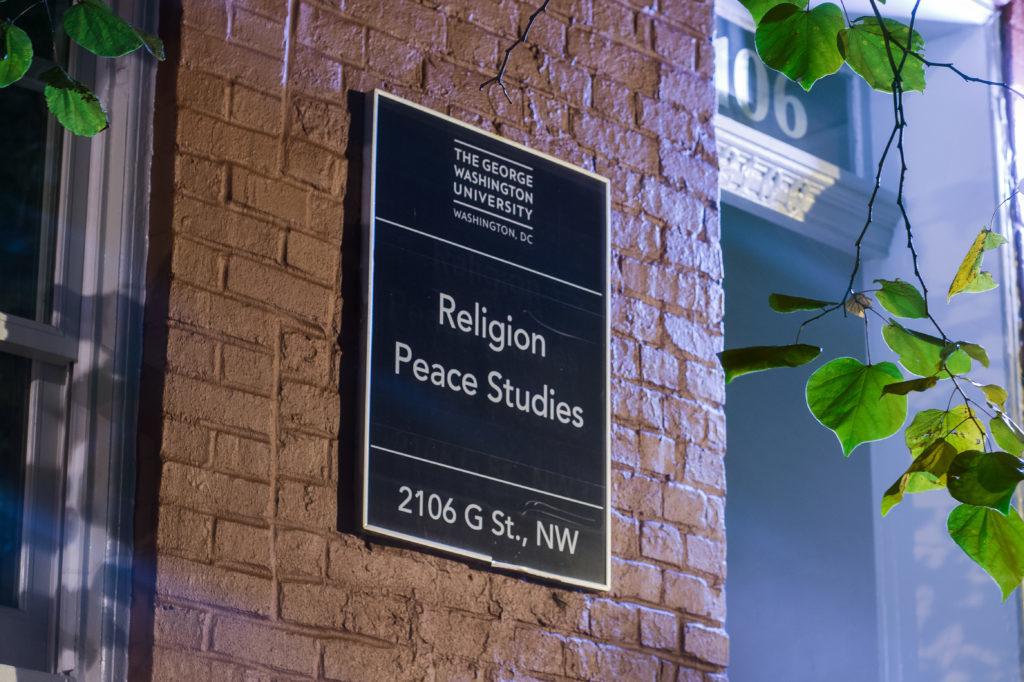Faculty in the religion department say the department’s budget is not enough to hire new faculty and launch projects – hampering the quality and diversity of the education it offers students.
At a community meeting earlier this month, a religion professor told University President Thomas LeBlanc that the department was understaffed and underfunded. The department’s chair said last week that there isn’t funding to hire experts in two major world religions that are vital to a full understanding of the subject.
To attract more students, the department made its curriculum requirements less specialized this semester, removing the requirement for majors to take courses in four different religions. Faculty posted signs advertising the new requirements across campus.
This semester, 24 classes are being offered in the department, slightly fewer than the 28 held last fall. There were just five religion majors on campus last year — down from 14 in 2012 — and making up 0.04 percent of the student body, according to statistics from the Office of Institutional Research and Planning.
“We need funding for more positions, full or part-time, to cover basic areas in our specialty.”
Robert Eisen, the chair of the religion department, said there are no full-time faculty to teach Hinduism and Buddhism, two out of the six major religious traditions that are part of the basic curriculum for religion majors. He said the department was unable to fill those positions even with part-time faculty.
“We need funding for more positions, full or part-time, to cover basic areas in our specialty,” Eisen said in an email. “But we also need funding to support new and promising ideas that will be good for our department and for the University.”
Eisen said the department was interested in launching a master’s degree program that would combine religion and international affairs, but it does not have the resources to even suggest the idea.
“I just want to make clear that I understand that there are competing interests at the University and we in religion can’t get everything we want,” Eisen said. “But something is askew when GW spends millions of dollars on building projects but can’t afford a few thousand dollars to hire even part-time instructors to cover basic courses in religion.”
Ben Vinson, the dean of the Columbian College of Arts and Sciences, said the department was an “integral” part of the college and that officials would continue to evaluate concerns within smaller departments moving forward.
“Currently, its faculty size is commensurate with the number of students taught,” Vinson said in an email. “We will continue to look at enrollment, the number of student majors and the number of courses offered to assess any future needs of the department.”
Vinson declined to say how many religion department professors had left in the past three years. He also declined to say if smaller departments across CCAS were facing similar issues.
Religion professors said more faculty are needed for the department to teach a full range of courses and meet the curriculum’s demands.
Irene Oh, a professor of religion, said the University should replace retiring tenured faculty like Alf Hiltebeitel, who taught classes in Hinduism. Hiltebeitel has not taught classes in the department since before last fall, according to the schedule of classes.
“It is short-sighted of the University not to replace Alf Hiltebeitel’s tenure line in Hinduism, given the significance of India historically, and in terms of India’s role geopolitically and economically in the present and future,” Oh said in an email.
In the last few years, tenure-track hiring at the University has slowed, sparking concerns from professors across the University about the impact on research and academic freedom.
“It’s a department where every professor is so passionate about their subjects in a way I have not seen from anyone else in this school.”
Religion major Drew Keavany said it can be difficult for students to find courses to fulfill major requirements. Majors have to take an introductory course, a Thinking About Religion course, a senior capstone class and nine electives, according to the department’s website.
“I know that when I came to GW I was interested in taking more classes in Judaism, but there just weren’t many options available for that,” he said. “I’ve been concentrating in Islam, but there are still very limited classes and they’re at some funky times.”
Anyu Silverman, a junior double majoring in religion and Judaic studies, said she had to negotiate her course requirements with the department to fulfill a concentration in Judaism, because many of the classes required for that concentration are no longer offered and the department can’t afford to hire professors to teach them.
She said the financial struggles are affecting a department that cares deeply about its field of expertise.
“It’s a department where every professor is so passionate about their subjects in a way I have not seen from anyone else in this school,” she said.




